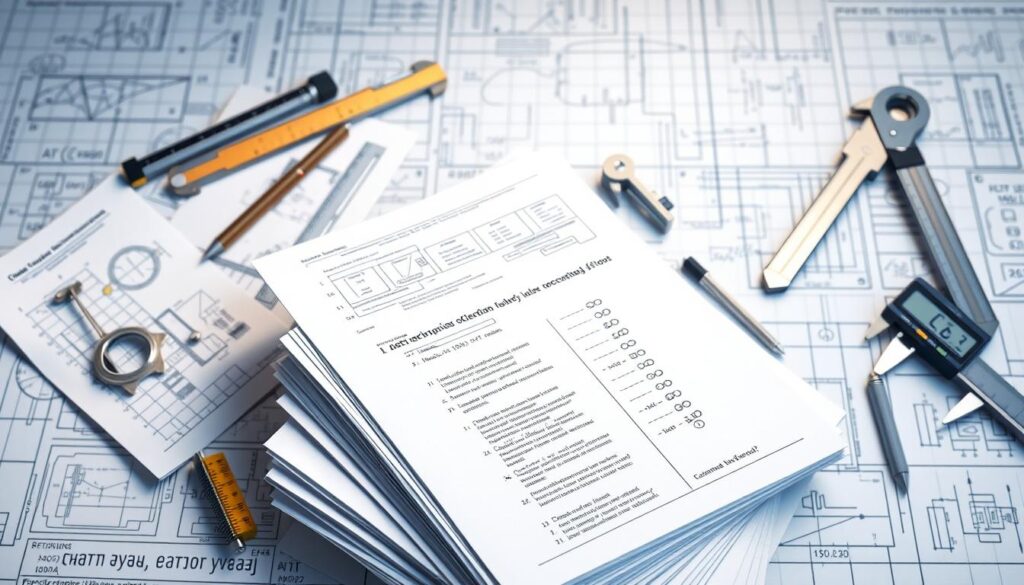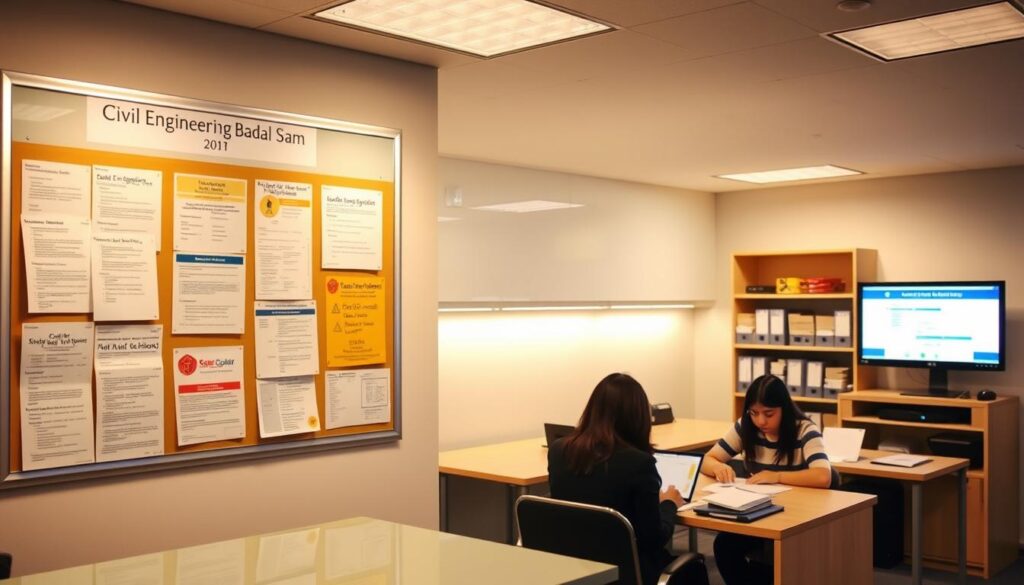Becoming a licensed professional engineer is a significant milestone, and passing the Civil Engineering Board Exam is a crucial step towards achieving this goal. With a pass rate that varies significantly across different states, it’s clear that thorough preparation is key to success.
Effective preparation involves understanding the exam format, familiarizing oneself with the types of questions asked, and practicing with relevant study materials. For those looking to manage civil engineering projects effectively, understanding the intricacies of project management is also vital, as discussed in our detailed guide on how to manage a civil engineering.
Key Takeaways
- Understand the exam format and content
- Practice with relevant study materials
- Familiarize yourself with the types of questions asked
- Develop a study plan tailored to your needs
- Utilize resources on project management for a comprehensive understanding
Understanding the Civil Engineering Board Exam
Understanding the structure and requirements of the Civil Engineering Board Exam is essential for effective preparation. The exam is a critical milestone for civil engineers seeking licensure, and being well-prepared is key to success.
What to Expect on Exam Day
On exam day, candidates can expect a comprehensive assessment of their knowledge and skills in civil engineering. According to the NCEES, the Civil Engineering Board Exam is a computer-based test that consists of multiple-choice questions and other formats. The exam is divided into two sections, with a scheduled break in between. Candidates should arrive early at the test center, bringing all required materials and identification.
Exam Day Tips:
- Arrive early at the test center.
- Bring all required materials and identification.
- Be prepared for a computer-based test format.
Format and Scoring Guide
The Civil Engineering Board Exam is designed to test a candidate’s knowledge and skills in various areas of civil engineering, including structural engineering, geotechnical engineering, transportation engineering, and environmental engineering. The exam format includes multiple-choice questions, and the scoring system is based on the number of correct answers. Understanding the exam format and scoring guide is crucial for effective preparation.
Exam Format Details:
- Computer-based test.
- Multiple-choice questions and other formats.
- Divided into two sections with a scheduled break.
The scoring guide provided by the NCEES will help candidates understand how their knowledge and skills are being assessed. By familiarizing themselves with the exam format and content, candidates can better prepare and increase their chances of success.
Key Topics Covered in the Exam

To become a licensed civil engineer, one must demonstrate proficiency in various engineering disciplines. The Civil Engineering Board Exam is designed to test a candidate’s knowledge and skills in several critical areas.
Structural Engineering
Structural engineering is a fundamental component of the exam, covering topics such as structural analysis, design of various structures, and understanding of materials and their properties. It’s essential to be familiar with the principles of statics, dynamics, and mechanics of materials.
Geotechnical Engineering
Geotechnical engineering involves the study of the earth’s materials and their properties. This includes understanding soil mechanics, foundation design, and the geological aspects that affect engineering projects. Candidates should be well-versed in geotechnical investigations and the application of this knowledge in real-world scenarios.
Transportation Engineering
Transportation engineering is another vital area, focusing on the planning, design, and operation of transportation systems. This encompasses highway design, traffic flow, and transportation planning principles. Familiarity with transportation regulations and standards is also crucial.
Environmental Engineering
Environmental engineering is critical in ensuring that engineering projects comply with environmental regulations and standards. This includes understanding water and wastewater treatment, air quality management, and environmental impact assessments. Candidates must demonstrate knowledge of environmental laws and regulations applicable to engineering practices.
| Topic | Description | Key Concepts |
|---|---|---|
| Structural Engineering | Covers structural analysis and design | Statics, dynamics, mechanics of materials |
| Geotechnical Engineering | Involves study of earth’s materials | Soil mechanics, foundation design |
| Transportation Engineering | Focuses on transportation systems | Highway design, traffic flow, transportation planning |
| Environmental Engineering | Ensures compliance with environmental regulations | Water and wastewater treatment, air quality management |
For those interested in pursuing a career in civil engineering, it’s worth exploring top civil engineering programs to understand the foundational knowledge required for the licensing exam.
Effective Study Strategies for Success
Mastering the Civil Engineering Board Exam demands a comprehensive and structured study plan. To achieve success, it’s essential to adopt effective study strategies that cater to the exam’s specific requirements.
Create a Study Schedule
Developing a study schedule is a critical step in preparing for the Civil Engineering Board Exam. By creating a timeline, you can allocate sufficient time for each topic, ensuring that you cover all the necessary material. A well-structured study schedule helps in staying organized and focused.
To create an effective study schedule, start by identifying the topics that need to be covered. Then, allocate specific time slots for each topic, considering the complexity and the time required to understand it. Regular breaks should be included to avoid burnout.
Use Practice Exams
Practice exams are an invaluable resource for Civil engineering licensure test prep. They help in familiarizing you with the exam format, timing, and the type of questions asked. By using practice exams, you can identify your strengths and weaknesses, allowing you to focus your study efforts more effectively.
It’s recommended to use a variety of practice exams from different sources to get a comprehensive understanding of the exam’s scope. This approach will also help in building your confidence and reducing exam-day anxiety.
Collaborate with Peers
Collaborating with peers who are also preparing for the Civil Engineering Board Exam can be highly beneficial. Study groups provide a platform to discuss complex topics, share resources, and learn from one another’s experiences. This collaborative approach can enhance your understanding and retention of the material.
To maximize the benefits of collaborating with peers, it’s essential to stay committed to the study group and actively participate in discussions. This not only helps in reinforcing your own knowledge but also contributes to the learning of others.
By implementing these effective study strategies, you can significantly improve your chances of success in the Civil Engineering Board Exam. Remember, a well-planned approach is key to achieving your goals.
Types of Civil Engineering Board Exam Questions

To succeed in the Civil Engineering Board Exam, candidates must be familiar with the different types of questions they will encounter, including multiple-choice and essay questions. The exam is designed to assess a candidate’s knowledge and skills comprehensively.
Multiple-Choice Questions
Multiple-choice questions are a significant component of the Civil Engineering Board Exam. These questions test a candidate’s ability to recall and apply fundamental concepts and principles. They often include a question stem followed by several possible answers, of which one is correct.
Tips for Multiple-Choice Questions:
- Read the question carefully to understand what is being asked.
- Eliminate obviously incorrect answers to increase the chances of selecting the correct answer.
- Make an educated guess if you are unsure, as there is no penalty for incorrect answers in many exams.
Essay Questions
Essay questions, on the other hand, require candidates to provide detailed, written responses to a given problem or question. These questions assess a candidate’s ability to think critically, solve problems, and communicate complex ideas effectively.
Tips for Essay Questions:
- Understand the question and identify the key issues that need to be addressed.
- Plan your response to ensure it is coherent and well-structured.
- Use relevant examples or case studies to support your arguments.
For more practice questions and to assess your readiness, you can refer to resources such as free civil FE exam practice PDF, which can help you familiarize yourself with the exam format and question types.
| Question Type | Description | Tips for Success |
|---|---|---|
| Multiple-Choice | Tests recall and application of concepts | Read carefully, eliminate wrong answers, make educated guesses |
| Essay | Assesses critical thinking and problem-solving | Understand the question, plan your response, use relevant examples |
As emphasized by experts, “Understanding the types of questions and practicing accordingly can significantly improve performance on the Civil Engineering Board Exam.” Familiarizing yourself with both multiple-choice and essay questions is crucial for achieving a high score.
Tips for Answering Multiple-Choice Questions
Effective strategies for answering multiple-choice questions can significantly improve your performance in the Civil Engineering Board Exam. To achieve this, it’s crucial to adopt a systematic approach.
Read Questions Carefully
The first step in answering multiple-choice questions is to read each question carefully. Understanding what is being asked is crucial before looking at the answer choices. Take your time to comprehend the question, and identify the key elements being tested.
Eliminate Obvious Wrong Answers
Once you’ve read the question, look at the answer choices and eliminate any obviously incorrect answers. This strategy increases your chances of selecting the correct answer by reducing the number of options. For instance, if you’re solving a problem related to structural engineering, eliminate answers that are not feasible or are outside the scope of the question.
Make an Educated Guess
If you’re unsure about the correct answer, make an educated guess from the remaining options. It’s essential to avoid leaving answers blank, as there’s a chance of getting it right. Use your knowledge and any relevant information from the question to make an informed decision.
To further enhance your ability to answer multiple-choice questions, consider the following tips:
- Manage your time effectively to ensure you have enough time to read and answer all questions.
- Stay calm and focused during the exam to avoid silly mistakes.
- Practice with sample questions to get familiar with the exam format and question types.
By implementing these strategies, you can improve your performance on the multiple-choice section of the Civil Engineering Licensing Exam. Remember, practice is key to mastering these techniques.
Importance of Practice Questions

To excel in the Civil Engineering Board Exam, candidates must practice with sample questions to build their confidence and identify weak areas. Practicing with board exam questions for civil engineers is an essential part of the preparation process.
Practice questions serve as a simulation of the actual exam experience, allowing candidates to familiarize themselves with the exam format and question types. By practicing with sample questions, candidates can assess their knowledge and understanding of various civil engineering concepts.
Building Confidence
One of the primary benefits of practicing with sample questions is that it helps build confidence. As candidates become more comfortable with the exam format and question types, they become more confident in their ability to tackle the exam. This confidence can significantly reduce exam-day anxiety, allowing candidates to perform at their best.
Identifying Weak Areas
Practicing with sample questions also helps candidates identify areas where they need to focus their studying. By analyzing their performance on practice questions, candidates can pinpoint weak areas and develop a targeted study plan to address these weaknesses. This focused approach to studying can significantly improve their overall performance on the exam.
Recommended Study Resources
The Civil Engineering Board Exam demands thorough preparation, and utilizing the right study resources is crucial for success. To help candidates prepare effectively, a variety of study materials are available, ranging from traditional textbooks to modern online courses.
Textbooks and Reference Materials
Textbooks and reference materials remain a cornerstone of preparation for the Civil Engineering Board Exam. These resources provide in-depth coverage of the exam topics, including structural analysis, geotechnical engineering, and transportation engineering. Some highly recommended textbooks include the FE Civil Review Manual, which is renowned for its comprehensive coverage of civil engineering principles and practices.
For those looking to dive deeper into specific areas, specialized reference books can offer detailed insights and examples. It’s essential to choose materials that are up-to-date and aligned with the exam format.
Online Resources and Courses
In addition to traditional textbooks, online resources and courses have become increasingly popular among exam candidates. These resources offer flexibility and can be particularly useful for those with busy schedules. Online practice exams, for instance, can help candidates become familiar with the exam format and timing. You can find free resources to learn civil engineering that can supplement your study plan.
Courses, both online and offline, provide structured learning experiences, often with the benefit of instructor guidance. Many courses also include practice problems and simulated exams, which are invaluable for assessing one’s knowledge and identifying areas for improvement.
| Resource Type | Description | Benefits |
|---|---|---|
| Textbooks | Comprehensive coverage of exam topics | In-depth understanding, detailed examples |
| Online Courses | Structured learning, flexible scheduling | Accessibility, instructor guidance, practice problems |
| Practice Exams | Simulated exam experience | Familiarity with exam format, timing, and question types |
Time Management During the Exam

The Civil Engineering Board Exam requires not only knowledge but also effective time management. To perform well, candidates must allocate their time wisely to answer all questions within the given timeframe.
Managing Your Time Effectively
Effective time management involves understanding the exam format and allocating time based on the number and type of questions. For instance, multiple-choice questions might require less time compared to essay questions. Candidates should practice with timed practice exams to get a feel for the time pressure and to develop a strategy for managing their time.
A good strategy is to first identify the questions that can be answered quickly and accurately, and then allocate more time to challenging questions. This approach helps in maximizing the score by ensuring that easy questions are not left unanswered due to time constraints.
Prioritizing Questions
Prioritizing questions is a crucial aspect of time management during the exam. Candidates should start by scanning through the exam paper to identify the questions they are most confident about. By doing so, they can allocate their time more efficiently, ensuring they spend more time on challenging questions and less on those they are familiar with.
For example, a candidate can categorize questions into three types: easy, moderate, and difficult. By focusing on easy and moderate questions first, they can secure a significant portion of the total marks before allocating time to the more difficult ones. This strategy can be particularly helpful in managing time effectively during the Civil Engineering Board Exam.
| Question Type | Recommended Time Allocation | Strategy |
|---|---|---|
| Easy | 1-2 minutes per question | Answer quickly and move on |
| Moderate | 2-3 minutes per question | Read carefully, answer to the point |
| Difficult | 3-5 minutes per question | Read multiple times, plan your answer |
By adopting these strategies, candidates can effectively manage their time during the Civil Engineering Board Exam, thereby enhancing their chances of success.
Importance of Professional Ethics in Civil Engineering
Civil engineers must navigate complex ethical dilemmas, making it vital to comprehend the principles of professional ethics. Understanding these principles is not only crucial for passing the Civil Engineering Board Exam but also for maintaining the integrity and trustworthiness of the engineering profession.
Professional ethics in civil engineering encompass a broad range of responsibilities, including ensuring public safety, being honest in professional interactions, and avoiding conflicts of interest. For instance, the NSPE Code of Ethics provides a framework that engineers can follow to make ethical decisions.
Understanding Ethical Responsibilities
Civil engineers have a duty to understand their ethical responsibilities, which include being aware of the potential impacts of their designs and decisions on the public and the environment. This involves staying updated with the latest standards and practices in the field.
Engineers should also be prepared to face real-life ethical dilemmas, such as balancing project costs with safety standards or dealing with pressure from clients to compromise on ethical grounds. Being able to analyze these situations and make informed, ethical decisions is a critical skill.
Real-Life Ethical Dilemmas in Engineering
Real-life ethical dilemmas are common in the engineering field. For example, an engineer might be asked to certify a project that does not meet all safety standards, or they might face a situation where a colleague is not following ethical practices. Knowing how to handle such dilemmas is crucial.
To prepare for these challenges, candidates for the Civil Engineering Board Exam should familiarize themselves with case studies and scenarios that test their ethical decision-making skills. This preparation not only helps in passing the exam but also in becoming a responsible and ethical professional in the field.
By understanding and applying ethical principles, civil engineers can ensure that their work is not only technically sound but also ethically robust, thereby contributing to the betterment of society and the environment.
Physical and Mental Preparation

As the Civil Engineering Board Exam approaches, it’s crucial to focus on both physical and mental preparation to ensure a strong performance. Adequate preparation in these areas can significantly impact your ability to stay focused and confident during the exam.
Get Plenty of Rest
Getting enough rest is essential for memory consolidation and learning retention. Aim for 7-9 hours of sleep each night in the week leading up to the exam to help your brain function at its best.
Establishing a consistent sleep schedule can also help regulate your body’s internal clock, making it easier to wake up feeling refreshed and alert on exam day.
Stay Hydrated and Nourished
Proper hydration and nutrition play a critical role in maintaining your energy levels and cognitive function. Drink plenty of water throughout the day, and avoid consuming high-caffeine or high-sugar beverages that can lead to energy crashes later.
Eating a balanced diet rich in fruits, vegetables, whole grains, and lean proteins can provide the necessary fuel for your brain and body. Avoid heavy meals on the night before the exam to prevent discomfort during the test.
For additional study habits and strategies to complement your physical and mental preparation, consider exploring resources like effective study habits for passing the Civil Engineering Board.
| Preparation Tip | Benefit |
|---|---|
| Get Plenty of Rest | Improves memory and cognitive function |
| Stay Hydrated | Maintains energy levels and focus |
| Eat Nutritious Food | Provides essential nutrients for brain function |
Post-Exam Reflection and Learning
After completing the Civil Engineering Board Exam, it’s essential to reflect on your performance to identify areas of improvement. This process helps you understand your strengths and weaknesses, allowing you to focus on specific areas that need more attention. By doing so, you can better prepare for future exams or professional endeavors.
Reviewing Your Performance
Reviewing your exam performance involves analyzing your answers, both correct and incorrect. This analysis can help you identify patterns in your mistakes, such as common misconceptions or areas where you lacked sufficient knowledge. By understanding these patterns, you can develop a more effective study plan for future exams.
A study found that exam wrappers, which are tools used to reflect on exam performance, can significantly improve student learning outcomes in engineering mechanics (source). This approach can be applied to civil engineering licensure test prep as well.
Learning from Mistakes
Learning from your mistakes is a crucial aspect of the learning process. By understanding where you went wrong, you can avoid making the same mistakes in the future. This involves not just memorizing the correct answers but also understanding the underlying concepts and principles.
To effectively learn from your mistakes, you should:
- Review the questions you got wrong and understand why you got them wrong.
- Identify the knowledge gaps that led to your mistakes.
- Develop a plan to address these knowledge gaps.
By following these steps, you can turn your mistakes into valuable learning experiences, ultimately improving your performance in future exams or professional settings.
Registering for the Civil Engineering Board Exam

To sit for the Civil Engineering Board Exam, candidates must first complete the registration process, which involves meeting specific requirements and deadlines. The registration process is a critical step towards becoming a licensed professional engineer.
Key Dates and Deadlines
One of the most important aspects of registering for the Civil Engineering Board Exam is being aware of the key dates and deadlines. Missing the registration deadline can result in a delayed exam sitting, which can impact career plans. Candidates should check the official exam website for the most current information on registration periods and deadlines.
As noted by the National Council of Examiners for Engineering and Surveying (NCEES), “candidates should allow sufficient time to complete the registration process, as it can take several weeks to process applications.”
“It’s essential to plan ahead and stay organized throughout the registration process.”
Required Documentation
Candidates must submit required documentation as part of the registration process. This typically includes transcripts, identification, and other supporting documents. Ensuring that all documentation is accurate and complete is crucial for a smooth registration experience.
For a comprehensive review and practice questions, candidates can refer to resources that specialize in civil engineering board exam review and practice exams. These resources can help candidates prepare for the exam and understand the types of civil engineering board exam questions they may encounter.
Benefits of Passing the Exam
Passing the Civil Engineering Board Exam is a significant milestone that can lead to numerous benefits, enhancing your career prospects and professional standing. Effective civil engineering licensing exam practice and thorough civil engineering licensure test prep are essential to achieving this goal.
Career Advancement Opportunities
Becoming a licensed professional engineer opens up new career paths and opportunities for advancement. It demonstrates your expertise and commitment to the profession, making you a more competitive candidate for senior roles or specialized positions.
Professional Licensure and Recognition
Achieving professional licensure not only enhances your career prospects but also earns you recognition within the engineering community. It signifies that you have met the rigorous standards set by the licensing authority, validating your skills and knowledge in civil engineering.
By passing the Civil Engineering Board Exam, you demonstrate your ability to tackle complex engineering challenges and contribute to the development of safe, efficient, and sustainable infrastructure. This achievement can lead to greater professional satisfaction and opportunities for growth.
